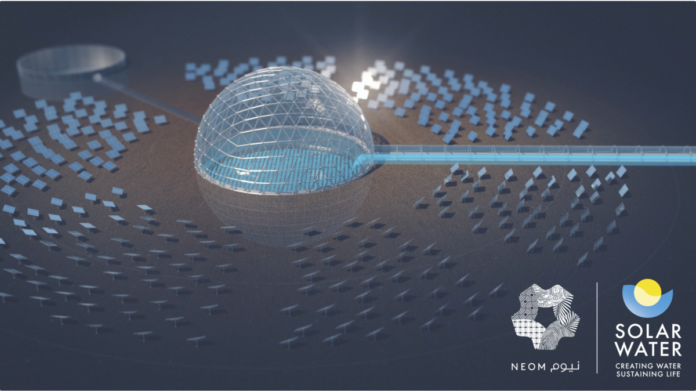NEOM, the flagship project of Saudi Arabia’s post-oil diversification plan, recently announced that it would be adopting a pioneering solar technology to produce cost-effective, environmentally-friendly water. It will also contribute towards fixing access to fresh water, a pressing problem in recent times given the climate change happening around the world.
UK-based Solar Power Plc has been contracted to build first-ever solar dome desalination plants in NEOM, which covers 26,500 km2 area in northwest Saudi Arabia.
Carbon Netural Technology
At an estimated $0.34/m3, the cost of producing water via ‘solar dome’ technology will be significantly lower than desalination plants using reverse osmosis methods. The technology will also significantly reduce the impact on the environment by producing more concentrated brine, a potentially harmful by-product of the water extraction process, according to a statement on the NEOM website.
The 100 per cent carbon neutral technology will also help reduce brine discharge, a potentially harmful by-product of the water extraction process, significantly cushioning the adverse impact on the environment. Commenting on the project, H.E. Abdulrahman Al-Fadli, Saudi Arabia’s Minister of Environment, Water and Agriculture, said, “NEOM’s adoption of this pilot supports Saudi Arabia’s sustainability goals, as outlined in the country’s National Water Strategy 2030, and is fully aligned with the sustainable development goals set out by the United Nations.”
Ground-breaking Approach
The project, developed at UK’s Cranfield University, is the first large-scale project of its kind to use Concentrating Solar Power (CSP) technology in seawater desalination. The process sees seawater pumped into a hydrological ‘solar dome’ made from glass and steel, before it is superheated, evaporated and eventually precipitated as fresh water. With the help of stored solar energy, the desalination process which can be done during the night, will reduce the total amount of brine that is created during the water extraction process. Typically, the high salt concentration in brine makes it more difficult and expensive to process. The solar dome process helps prevent any damage to marine life as no brine is discharged into the sea, the statement said.
According to Nadhmi Al-Nasr, CEO of NEOM is constantly championing the cause of environmental conservation and adoption of this technology will not only reduce cost, but also allow access to sustainable fresh water. “Working together with the Ministry of Environment, Water and Agriculture we can expand the implementation of this technology beyond NEOM,” he added.
Over one billion people lack access to clean water and this technology and NEOM’s pioneering solar desalination project promises to lay the groundwork for a more sustainable global future, where freshwater can be accessible to all.
Work on the first solar dome is expected to be completed by the end of 2020.






